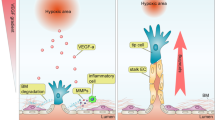Abstract
The ability to study the role of specific genes in endothelial cell biology is made possible by our ability to modulate their expression through siRNA or knockout technologies. However, many in vitro protocols, particularly those of a biochemical nature, require large numbers of endothelial cells. These types of analyses are encumbered by the need to repeatedly produce and characterize primary endothelial cell cultures and can be greatly facilitated by the use of immortalized microvascular endothelial cells. However, we have found that the manipulation of gene expression in these cells is not always straight forward. Here we describe how we alter gene expression in polyoma middle T antigen immortalized microvascular endothelial cells isolated from wild-type and genetically modified mice to study the role of cell adhesion molecules in downstream assays.
James A. G. E. Taylor and Christopher J. Benwell are contributed equally.
Access this chapter
Tax calculation will be finalised at checkout
Purchases are for personal use only
Similar content being viewed by others
References
Sneddon LU, Halsey LG, Bury NR (2017) Considering aspects of the 3Rs principles within experimental animal biology. J Exp Biol 220(Pt 17):3007–3016. https://doi.org/10.1242/jeb.147058
Alghamdi AAA, Benwell CJ, Atkinson SJ, Lambert J, Johnson RT, Robinson SD (2020) NRP2 as an emerging angiogenic player; promoting endothelial cell adhesion and migration by regulating recycling of alpha5 integrin. Front Cell Dev Biol 8:395. https://doi.org/10.3389/fcell.2020.00395
Ni CW, Kumar S, Ankeny CJ, Jo H (2014) Development of immortalized mouse aortic endothelial cell lines. Vasc Cell 6(1):7. https://doi.org/10.1186/2045-824X-6-7
Robinson SD, Reynolds LE, Kostourou V, Reynolds AR, da Silva RG, Tavora B, Baker M, Marshall JF, Hodivala-Dilke KM (2009) Alphav beta3 integrin limits the contribution of neuropilin-1 to vascular endothelial growth factor-induced angiogenesis. J Biol Chem 284(49):33966–33981. https://doi.org/10.1074/jbc.M109.030700
Steri V, Ellison TS, Gontarczyk AM, Weilbaecher K, Schneider JG, Edwards D, Fruttiger M, Hodivala-Dilke KM, Robinson SD (2014) Acute depletion of endothelial beta3-integrin transiently inhibits tumor growth and angiogenesis in mice. Circ Res 114(1):79–91. https://doi.org/10.1161/CIRCRESAHA.114.301591
Tavora B, Reynolds LE, Batista S, Demircioglu F, Fernandez I, Lechertier T, Lees DM, Wong PP, Alexopoulou A, Elia G, Clear A, Ledoux A, Hunter J, Perkins N, Gribben JG, Hodivala-Dilke KM (2014) Endothelial-cell FAK targeting sensitizes tumours to DNA-damaging therapy. Nature 514(7520):112–116. https://doi.org/10.1038/nature13541
Atkinson SJ, Gontarczyk AM, Alghamdi AA, Ellison TS, Johnson RT, Fowler WJ, Kirkup BM, Silva BC, Harry BE, Schneider JG, Weilbaecher KN, Mogensen MM, Bass MD, Parsons M, Edwards DR, Robinson SD (2018) The beta3-integrin endothelial adhesome regulates microtubule-dependent cell migration. EMBO Rep 19(7):e44578. https://doi.org/10.15252/embr.201744578
Sorensen I, Adams RH, Gossler A (2009) DLL1-mediated Notch activation regulates endothelial identity in mouse fetal arteries. Blood 113(22):5680–5688. https://doi.org/10.1182/blood-2008-08-174508
Claxton S, Kostourou V, Jadeja S, Chambon P, Hodivala-Dilke K, Fruttiger M (2008) Efficient, inducible Cre-recombinase activation in vascular endothelium. Genesis 46(2):74–80. https://doi.org/10.1002/dvg.20367
Cebe-Suarez S, Zehnder-Fjallman A, Ballmer-Hofer K (2006) The role of VEGF receptors in angiogenesis; complex partnerships. Cell Mol Life Sci 63(5):601–615. https://doi.org/10.1007/s00018-005-5426-3
Herzog B, Pellet-Many C, Britton G, Hartzoulakis B, Zachary IC (2011) VEGF binding to NRP1 is essential for VEGF stimulation of endothelial cell migration, complex formation between NRP1 and VEGFR2, and signaling via FAK Tyr407 phosphorylation. Mol Biol Cell 22(15):2766–2776. https://doi.org/10.1091/mbc.E09-12-1061
Soldi R, Mitola S, Strasly M, Defilippi P, Tarone G, Bussolino F (1999) Role of alphavbeta3 integrin in the activation of vascular endothelial growth factor receptor-2. EMBO J 18(4):882–892. https://doi.org/10.1093/emboj/18.4.882
Krilleke D, DeErkenez A, Schubert W, Giri I, Robinson GS, Ng YS, Shima DT (2007) Molecular mapping and functional characterization of the VEGF164 heparin-binding domain. J Biol Chem 282(38):28045–28056. https://doi.org/10.1074/jbc.M700319200
Author information
Authors and Affiliations
Corresponding author
Editor information
Editors and Affiliations
Rights and permissions
Copyright information
© 2022 The Author(s), under exclusive license to Springer Science+Business Media, LLC, part of Springer Nature
About this protocol
Cite this protocol
Taylor, J.A.G.E., Benwell, C.J., Robinson, S.D. (2022). Using Immortalized Endothelial Cells to Study the Roles of Adhesion Molecules in VEGF-Induced Signaling. In: Fiedler, L.R., Pellet-Many, C. (eds) VEGF Signaling. Methods in Molecular Biology, vol 2475. Humana, New York, NY. https://doi.org/10.1007/978-1-0716-2217-9_9
Download citation
DOI: https://doi.org/10.1007/978-1-0716-2217-9_9
Published:
Publisher Name: Humana, New York, NY
Print ISBN: 978-1-0716-2216-2
Online ISBN: 978-1-0716-2217-9
eBook Packages: Springer Protocols




